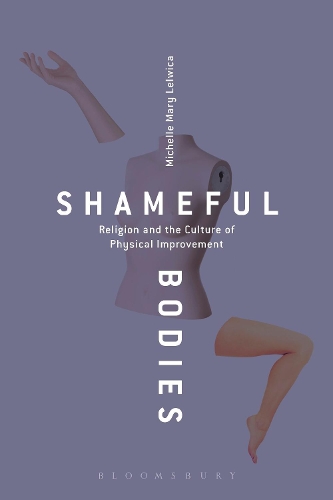
Shameful Bodies: Religion and the Culture of Physical Improvement
(Paperback)
Available Formats
Publishing Details
Shameful Bodies: Religion and the Culture of Physical Improvement
By (Author) Michelle Mary Lelwica
Bloomsbury Publishing PLC
Bloomsbury Academic
12th January 2017
United Kingdom
Classifications
Tertiary Education
Non Fiction
Cultural studies
201.7
Physical Properties
Paperback
288
Width 156mm, Height 234mm
408g
Description
What happens when your body doesnt look how its supposed to look, or feel how its supposed to feel, or do what its supposed to do Who or what defines the ideals behind these expectations How can we challenge them and live more peacefully in our bodies Shameful Bodies: Religion and the Culture of Physical Improvement explores these questions by examining how traditional religious narratives and modern philosophical assumptions come together in the construction and pursuit of a better body in contemporary western societies. Drawing on examples from popular culture such as self-help books, magazines, and advertisements, Michelle Mary Lelwica shows how these narratives and assumptions encourage us to go to war against our bodiesto fight fat, triumph over disability, conquer chronic pain and illness, and defy aging. Through an ethic of conquest and conformity, the culture of physical improvement trains us not only to believe that all bodily processes are under our control, but to feel ashamed about those parts of our flesh that refuse to comply with the cultural ideal. Lelwica argues that such shame is not a natural response to being fat, physically impaired, chronically sick, or old. Rather, body shame is a religiously and culturally conditioned reaction to a commercially-fabricated fantasy of physical perfection. While Shameful Bodies critiques the religious and cultural norms and narratives that perpetuate external and internalized judgment and aggression toward shameful bodies, it also engages the resources of religions, especially feminist theologies and Buddhist thought/practice, to construct a more affirming approach to health and healingan approach that affirms the diversity, fragility, interdependence, and impermanence of embodied life.
Reviews
Lelwica (Concordia College) explores how the fascination with better bodies articulates contemporary priorities and social anxieties. While deftly analyzing the capitalist imperatives driving pop culture, Lelwica draws attention to the implicit religiosity of this fascination, in at least two senses. The first sense suggests how sacred texts and traditions impact how one perceives embodiment; the second sense argues for the quasi-religious functioning of perfecting ones physique. Here the author contends that exercise or beauty regimens operate like religious ritual, and the rhetoric of somatic improvement acts like a salvation myth. This intriguing premise is only partially borne out in her readings of biblical texts and historical examples. Direct influences from religious discourses, such as theologies of Incarnation or Buddhist notions of impermanence, remain frustratingly vague, such that the enterprise begs the question of what is meant by secular. Yet Lelwica is, as she writes in chapter 2, more interested in intersections than causes, and her explication of the underlying connections between ableism, ageism, and fat (and other forms of body) shaming are both clear and convincing. The author integrates autobiographical passages with the ease of an experienced teacher. Summing Up: Recommended. Lower- and upper-division undergraduates; graduate students. * CHOICE *
Shameful Bodies takes us on a wonderful journey of renewed understanding of the traps of our dominant culture regarding our bodies. It opens a new creative understanding based on freedom and mutual respect. * Ivone Gebara, Brazilian Sister of Our Lady, Canonesses of St Augustine, and independent scholar, Brazil *
This excellent exploration is of interest not only to readers in Religious Studies, but also in Disability, Postcolonial and Feminist Studies. I highly recommend this exceptional work. * Elisabeth Schssler Fiorenza, Krister Stendahl Professor, Harvard University, USA *
[a] wide-ranging, insightful, and very instructive analysis of Western cultures obsession with bodily perfection ... A book that should appeal to anyone, including high school and college students, interested in the profound impact religion and culture have in shaping our identities and deepest sense of self. * Reading Religion *
Author Bio
Michelle Mary Lelwica is Professor of Religion at Concordia College, USA. She is the author of The Religion of Thinness (2009) and Starving for Salvation (1999).
